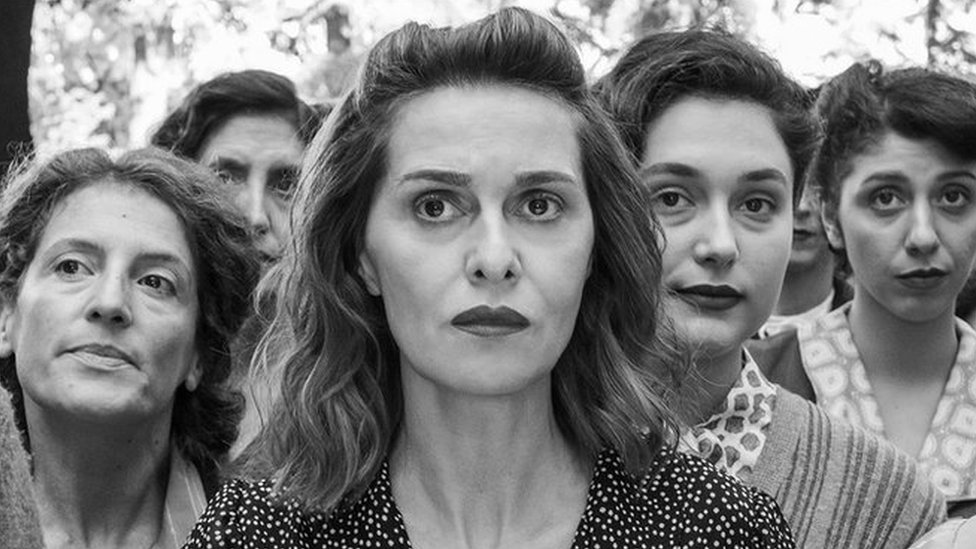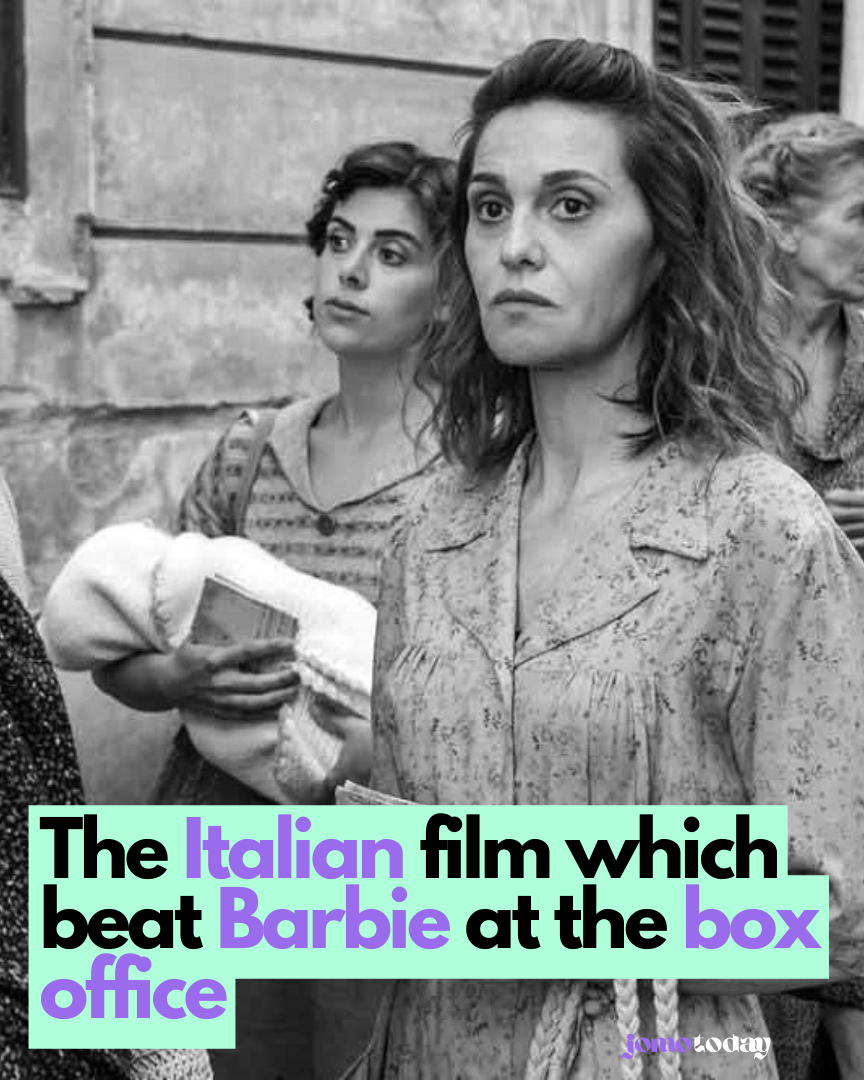Italian film “There’s Still Tomorrow,” directed by Paola Cortellesi, surpassed Barbie at the box office, highlighting a cry for change in Italy’s film industry.

Director Paola Cortellesi on the cry for change in Italy’s chart-topping There’s Still Tomorrow.
There’s Still Tomorrow (C’è Ancora Domani), created by Paola Cortellesi, a multi-talented artist at 50, is now making its way across Europe, including the UK. It stormed Italy last year, surpassing both Barbie and Oppenheimer in revenue.
By last month, its box office earnings had reached approximately £31.5m, making it Italy’s top-grossing film of 2023 and the most triumphant work ever helmed by an Italian female director.
Reflecting on its overwhelming success, Cortellesi expressed her astonishment to BBC News, stating, “Nobody could have foreseen the immense outpouring of engagement and fondness from audiences for this film.”
Having been an actress for nearly three decades and a scriptwriter for the past ten years, I’ve recently ventured into directing my first film at the age of 50. It’s truly gratifying to see it share the screen and box office with a major production like Barbie, especially considering both films delve into the female experience.
Part of the resonance of “There’s Still Tomorrow” in Italy may stem from the portrayal of its protagonist, Delia, portrayed by Cortellesi herself, who endures harrowing physical and emotional abuse at the hands of her husband. Set in post-war Rome in 1946, a pivotal year when Italian women gained the right to vote, the film follows Delia, a housewife and mother grappling with poverty and oppression.
The narrative of the film strikes a chord with contemporary Italian viewers. Recent police statistics reveal a stark reality: 120 women lost their lives in Italy in 2023, equating to nearly one every three days. Shockingly, over half of these tragic deaths were at the hands of partners or ex-partners. Another quarter were perpetrated by their own children, with sons being responsible in 89% of those cases.
The scourge of femicide erupted into public consciousness in Italy in November 2023, shortly after the debut of “There’s Still Tomorrow.” The nation was shaken by the killing of Giulia Cecchettin, a 22-year-old university student allegedly murdered by her former boyfriend, who now awaits trial.
Cortellesi suggests that her film delves into a cultural mindset that she contends “has persisted for thousands of years”.
“Crimes of passion” were not deemed illegal in Italy until 1981. In July 2023, judges in Rome gained global attention by acquitting a school caretaker of groping a 17-year-old schoolgirl due to the assault lasting less than ten seconds. This incident sparked a disturbing trend on Instagram and TikTok in Italy, with the hashtag #10secondi accompanying videos of “brief groping.” Actress Cortellesi highlights the grim reality of the prevalent issue of violence against women, particularly in Italy.
“Femicide frequently represents the devastating conclusion of a series of events that didn’t originate in such a manner. The backstory leading to the appalling occurrence of a woman’s death every 72 hours in Italy remains largely unknown. It hints at a pattern of violence that frequently remains unreported to authorities until it reaches a critical escalation.”
The director emphasizes that themes surrounding violence against women have been central to her scriptwriting for years, as well as evident in her roles on both stage and screen, despite not having experienced it personally herself.
She elaborates, “My aim was to create a modern film set in a historical context to juxtapose what has evolved and what remains unchanged.”
“While women may have gained certain rights and protections, society still perpetuates a mindset that perverts love into ownership. This underscores the importance of improved education.”
Even though “There’s Still Tomorrow” is set in 1946 and filmed in black and white as an homage to classic Italian cinema, it delves into the serious topic of domestic violence with a touch of ironic humor. The filmmaker believes that this approach allows audiences to engage with the story more readily. She explains, “In my previous scripts, I’ve employed this comedic language to address weighty themes. It’s not about outright comedy, but rather using humor to broach serious subjects. Through humor, I aim to initiate discussions on these topics without being confrontational in my cinematic style.”
Upon its premiere in Italy, the film was described by the English-language publication Screen Daily as “a poignant narrative of endurance and sacrifice,” praising Cortellesi’s stylish execution. Critic Allan Hunter noted that the depiction of domestic violence is at times portrayed as a grotesque yet captivating dance, while moments of exaggerated romance are tempered by dry humor.
The film’s enduring success and financial prosperity are largely attributed to traditional word-of-mouth promotion and the filmmakers’ dedication to touring regional towns and cities, conducting extensive Q&A sessions with audiences.
Cortellesi notes that 45% of her audience in Italy comprised men, which she finds “truly gratifying.”
“The intention was never to create a film antagonistic toward Italian men; rather, it was meant as an invitation to share experiences and journey together through life. I wanted to ensure that men didn’t feel excluded or targeted by the film.
“I believe the film’s tone and portrayal of its characters allowed men to empathize with the female leads, evident in their reactions during screenings.
“Many men were compelled to share their own stories during the post-screening Q&A sessions, which often proved deeply touching.”
In essence, the actress and director affectionately refers to her 11-year-old daughter as her “muse” for the film, characterizing it as “a tale of maternal and filial affection.”
“The inception of this entire project stemmed from a moment when I was reading her a book on women’s rights, and my daughter was astounded by the idea that there was a time when our rights weren’t legally protected. It struck me then that we must communicate to younger generations that their rights aren’t inherently guaranteed,” she explains.
“Just because we attain a certain milestone, it doesn’t ensure its permanence. I felt compelled, in a sense, to begin passing the torch to the younger generation.”
It’s got everyone talking and for all the right reasons. This unexpected success story is a testament to the power of compelling storytelling and captivating characters.
The movie’s unique narrative and strong character development have struck a chord with audiences of all ages. It’s a refreshing change to see a film capture hearts and minds beyond the typical blockbuster offerings.
The success of this Italian film not only showcases the variety and depth of the film industry but also emphasizes the importance of global storytelling. It’s a reminder that great stories know no boundaries and can resonate with diverse audiences worldwide.
So, next time you’re planning a movie night, consider giving this Italian gem a watch. You might just be pleasantly surprised by the charm and magic it has to offer. Let’s celebrate the diversity of cinema and embrace the unexpected triumphs that remind us of the beauty of storytelling. Cheers to more hidden treasures making their mark in the world of film!
Read More: The Economic Impact and Enchanting Extravaganza of Barbie Movies
Disclaimer:
This content is AI-generated using IFTTT AI Content Creator. While we strive for accuracy, it’s a tool for rapid updates. We’re committed to filtering information, not reproducing or endorsing misinformation. – Jomotoday for more information visit privacy policy






Leave a Comment